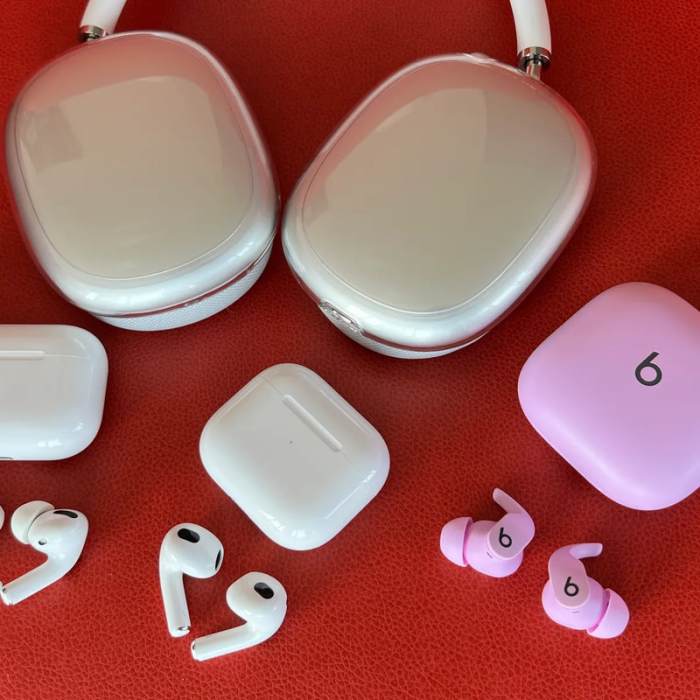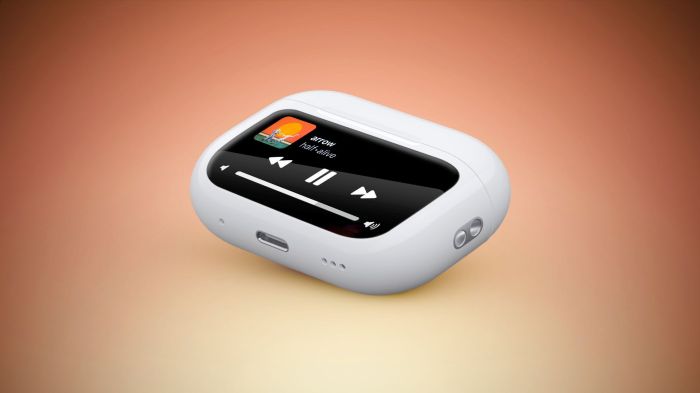New AirPods Release Timeline
Apple’s AirPods have become synonymous with wireless audio, and fans eagerly anticipate each new iteration. While a late 2024 release date is being rumored for the next generation, it’s essential to understand the historical context of Apple’s AirPods release cycle to predict the potential impact of any delays or changes.
Previous AirPods Release Timeline
The timeline of AirPods releases reveals a pattern of consistent innovation and improvement. Examining the previous release dates can help us understand the typical release cycle and predict the likelihood of delays.
- AirPods (1st generation): December 2016 – Apple’s first foray into the wireless earbud market, offering seamless integration with Apple devices.
- AirPods (2nd generation): March 2019 – This generation brought improved audio quality, hands-free Siri access, and a wireless charging case.
- AirPods Pro (1st generation): October 2019 – Apple introduced active noise cancellation and a more secure fit with these earbuds.
- AirPods (3rd generation): October 2021 – This generation featured a new design, spatial audio support, and improved battery life.
- AirPods Pro (2nd generation): September 2022 – The latest AirPods Pro boast enhanced active noise cancellation, a new H2 chip, and personalized spatial audio.
Impact of Delays
A delay in the release of the new AirPods could have several implications.
- Market Competition: Delays could allow competitors to gain ground in the increasingly crowded wireless earbuds market. Apple’s rivals, like Samsung and Sony, are constantly innovating, and any delay could give them an advantage.
- Consumer Demand: A delay could also affect consumer demand. If the release date is pushed back, consumers might lose interest or opt for alternative products. This could potentially impact Apple’s sales figures.
- Product Development: Delays could be a sign that Apple is encountering challenges in product development. These challenges could be related to software, hardware, or manufacturing issues, and could impact the final product’s quality.
Alignment with Apple’s Product Strategy
The timing of the new AirPods release aligns with Apple’s broader product strategy. Apple typically introduces new products in the fall, coinciding with the launch of new iPhones and other devices.
- Ecosystem Integration: The fall release allows Apple to showcase the new AirPods alongside other devices, highlighting their seamless integration into the Apple ecosystem. This creates a cohesive product experience for consumers.
- Holiday Sales: Releasing new products in the fall positions them for the holiday shopping season, a crucial period for consumer electronics sales. This strategy maximizes potential revenue and customer acquisition.
- Competition: Apple often strategically releases its products around the same time as its competitors. This allows Apple to maintain its competitive edge and keep up with the latest industry trends.
Expected Features and Enhancements
The next generation of AirPods is rumored to boast a significant upgrade in features and enhancements, promising a more immersive and personalized audio experience. While Apple has yet to officially unveil these features, industry insiders and leaks suggest some exciting possibilities that could redefine the way we interact with our audio devices.
Enhanced Audio Quality
The new AirPods are expected to feature improved audio quality, potentially through the implementation of advanced audio codecs like LDAC or aptX Adaptive. These codecs offer higher bitrates and lower latency compared to the current AAC codec used in AirPods, resulting in a richer, more detailed sound with a wider dynamic range. This upgrade could enhance the listening experience for music, podcasts, and audiobooks, providing a more nuanced and immersive sound.
Potential Design Changes: New Airpods Reportedly Launched Late Next Year
Apple’s AirPods have been a game-changer in the wireless earbuds market, and with each iteration, they’ve pushed the boundaries of design and functionality. As we look towards the next generation of AirPods, expected to launch in late 2024, it’s natural to wonder what design changes Apple might have in store. While details are still under wraps, we can analyze the current trends in earbud design and Apple’s past design choices to speculate on the potential changes.
Comparison with Previous Models
The design of the AirPods has evolved over the years, with each generation bringing subtle but significant changes. The first-generation AirPods were instantly recognizable for their long stems and bulky case. The second generation saw a slight reduction in stem length and a more compact case. The third generation brought a more contoured design with shorter stems and a more ergonomic fit. The AirPods Pro, with their in-ear design and interchangeable ear tips, offered a more secure fit and improved noise cancellation.
The rumored design changes for the next-generation AirPods suggest a departure from the traditional AirPods design. The stems might be even shorter or completely eliminated, creating a more compact and discreet look. The charging case might also undergo a significant makeover, potentially becoming more compact and sleek.
Market Impact and Competition
The release of new AirPods is expected to have a significant impact on the wireless earbud market, which has become increasingly competitive in recent years. Several major players have established themselves in this space, each vying for a share of the growing consumer demand.
Competitive Landscape, New airpods reportedly launched late next year
The wireless earbud market is dominated by several key players, each offering a range of features and price points. Some of the most notable competitors to the new AirPods include:
- Apple: Apple’s existing AirPods lineup, including the AirPods Pro and AirPods Max, are direct competitors. These earbuds offer a seamless integration with Apple devices, strong audio quality, and a comfortable fit. However, they can be expensive compared to some rivals.
- Samsung: Samsung’s Galaxy Buds series, including the Galaxy Buds Pro and Galaxy Buds 2 Pro, offer a compelling alternative to AirPods, particularly for Android users. They feature active noise cancellation, good sound quality, and a comfortable fit. Their pricing is competitive with Apple’s offerings.
- Sony: Sony’s WF-1000XM4 and WF-1000XM5 are known for their exceptional noise cancellation capabilities, making them a popular choice for those seeking a quiet listening experience. They also boast excellent sound quality and a comfortable fit. However, they can be more expensive than other options.
- Bose: Bose’s QuietComfort Earbuds II and SoundSport Free are highly regarded for their audio quality and noise cancellation. They offer a comfortable fit and a durable build, making them suitable for both everyday use and workouts. Their pricing is competitive with other premium brands.
- Google: Google’s Pixel Buds series, including the Pixel Buds Pro, are a strong contender in the market, offering a combination of noise cancellation, comfortable fit, and good sound quality. They also integrate well with Google’s ecosystem, making them a good choice for Android users.
Impact on the Market
The release of new AirPods is likely to intensify competition in the wireless earbud market. Apple’s strong brand recognition and loyal customer base could give the new AirPods a significant advantage, potentially leading to increased sales and market share.
The new AirPods are expected to offer several enhancements and features, including improved audio quality, advanced noise cancellation, and potentially a new design. These features could make them more appealing to a wider range of consumers, potentially drawing customers away from competing brands.
However, the competitive landscape is fierce, and other brands are constantly innovating and releasing new models. To remain competitive, Apple will need to ensure that the new AirPods offer a compelling value proposition, particularly in terms of features, price, and overall user experience.
Comparison Table
The following table compares the new AirPods to some of their major competitors, highlighting key features and price points:
| Feature | New AirPods | Apple AirPods Pro | Samsung Galaxy Buds 2 Pro | Sony WF-1000XM4 | Bose QuietComfort Earbuds II | Google Pixel Buds Pro |
|---|---|---|---|---|---|---|
| Active Noise Cancellation | Yes (improved) | Yes | Yes | Yes | Yes | Yes |
| Transparency Mode | Yes | Yes | Yes | Yes | Yes | Yes |
| Spatial Audio | Yes | Yes | Yes | Yes | No | Yes |
| Water Resistance | IPX4 | IPX4 | IPX7 | IPX4 | IPX4 | IPX4 |
| Battery Life | 6 hours (up to 24 hours with case) | 4.5 hours (up to 24 hours with case) | 5 hours (up to 28 hours with case) | 8 hours (up to 32 hours with case) | 6 hours (up to 18 hours with case) | 7 hours (up to 31 hours with case) |
| Price | $199 | $249 | $229 | $279 | $299 | $199 |
Consumer Expectations and Hype
The anticipation surrounding the release of new AirPods is always high, with consumers eager to see what Apple has in store. This anticipation is fueled by the brand’s reputation for innovation, the popularity of the current AirPods models, and the constant stream of leaks and rumors that precede each new release.
Pre-Release Hype Impact
Pre-release hype plays a crucial role in shaping consumer expectations and ultimately influencing the success of a product. In the case of the new AirPods, the pre-release hype could be a double-edged sword. On one hand, it could generate significant interest and create a buzz that drives sales. On the other hand, if the new AirPods fail to meet the high expectations set by the hype, it could lead to disappointment and negative feedback.
Potential User Reactions
Consumer reactions to the new AirPods will likely be diverse, ranging from enthusiastic praise to critical disappointment. Here’s a breakdown of potential user reactions:
Positive Reactions
- Improved Sound Quality: Many users hope for significant enhancements in sound quality, including better bass response, clearer highs, and wider soundstage.
- Longer Battery Life: Extended battery life is a common desire, allowing for more listening time without needing to recharge.
- Enhanced Noise Cancellation: Users expect advancements in noise cancellation technology, offering a more immersive listening experience.
- New Features: Features like spatial audio, personalized audio profiles, and improved integration with other Apple devices are eagerly anticipated.
- Design Refinements: Consumers hope for a more comfortable and secure fit, as well as a more aesthetically pleasing design.
Negative Reactions
- Price Increase: A significant price increase could lead to negative feedback, especially if the new features don’t justify the cost.
- Minor Upgrades: If the new AirPods only offer incremental improvements over the previous models, some users may feel disappointed.
- Compatibility Issues: Issues with compatibility with non-Apple devices could be a source of frustration for some users.
- Quality Concerns: Any perceived decline in build quality or durability could lead to negative reviews and reduced consumer confidence.
- Limited Availability: Limited initial availability could create frustration and potentially impact sales in the early stages.
New airpods reportedly launched late next year – With Apple’s track record of innovation, it’s safe to say that the new AirPods are poised to shake up the wireless earbuds market. Whether they deliver on the hype and become the must-have tech accessory of 2024 remains to be seen. But one thing’s for sure: the anticipation is building, and the wait for the official unveiling is sure to be agonizing for Apple fans worldwide.
While we’re waiting for the new AirPods to drop late next year, it seems like Facebook is getting in on the private communication game. They’re testing out a feature called “private comments” facebook testing private comments , which could be a game-changer for how we interact online. Maybe by the time those AirPods arrive, we’ll be having secret conversations about our favorite music right on Facebook.
 Standi Techno News
Standi Techno News

